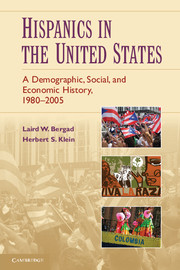Book contents
- Frontmatter
- Contents
- List of Graphs, Tables, and Maps
- Introduction
- 1 Immigration to the United States to 1980
- 2 The Hispanic Population to 1980
- 3 Population Growth and Dispersion, 1980–2005
- 4 The Demography of the Hispanic Population
- 5 Wealth and Poverty
- 6 Educational Attainment
- 7 Citizenship, the Latino Electorate, and Voter Participation
- 8 Occupational Structures, Employment, and Unemployment
- 9 English Language Abilities and Domestic Usage
- 10 Hispanic Business Ownership
- 11 Race
- 12 Endogamous and Exogamous Marriage Patterns among Latino Household Heads
- 13 Conclusion
- Bibliography
- Index
- References
9 - English Language Abilities and Domestic Usage
Published online by Cambridge University Press: 05 June 2012
- Frontmatter
- Contents
- List of Graphs, Tables, and Maps
- Introduction
- 1 Immigration to the United States to 1980
- 2 The Hispanic Population to 1980
- 3 Population Growth and Dispersion, 1980–2005
- 4 The Demography of the Hispanic Population
- 5 Wealth and Poverty
- 6 Educational Attainment
- 7 Citizenship, the Latino Electorate, and Voter Participation
- 8 Occupational Structures, Employment, and Unemployment
- 9 English Language Abilities and Domestic Usage
- 10 Hispanic Business Ownership
- 11 Race
- 12 Endogamous and Exogamous Marriage Patterns among Latino Household Heads
- 13 Conclusion
- Bibliography
- Index
- References
Summary
The importance of language skills is highlighted by a clear correlation between English language abilities, social mobility, and income levels. Among Latinos, levels of English language proficiencies are, of course, linked to nativity. Nearly all adult Latinos born in the United States speak English well or very well, and in 2005 about 36% of all domestic-born Latinos 5 years of age and older spoke only English. Yet, nearly 48% of all foreign-born Latinos spoke no English or did not speak English well in 2005. Since foreign-born Latinos increased from 29% of the total Hispanic population in 1980 to nearly 42% in 2005, there was a parallel rise in the percentage of the entire Latino population that did not speak English at all or spoke English poorly. In 1980 nearly 20% of all Latinos had little domination over the English language; by 2005 this had increased to 25%, largely because of the increase in the foreign-born. There were only small differentiations in English language skills by sex among both the foreign- and domestic-born. A slightly greater percentage of foreign-born Latinas (49.4%) had poor or no English language skills compared with 45.8% of males (see Table 9.1). There were, however, distinctions based on educational backgrounds among the foreign-born. Additionally, while lower levels of English language proficiency were found among the foreign-born of all Latino subgroups, the level varied considerably by nationality.
Within each Latino national subgroup the percentage of the overall population with either poor or excellent English language skills was directly linked to the volume of immigration between 1980 and 2005 and the relative importance of the foreign-born within each population. Latino nationalities with greater percentages of the foreign-born had higher portions of their populations with poor English-language skills. Among the dominant Mexican-origin population the domestic-born had great proficiency in English and by 2005 less than 5% reported that they spoke no English or did not speak English very well. More than 36% spoke English exclusively. However, with the large-scale immigration of Mexicans after 1980 the portion of foreign-born Mexicans in the United States increased from about 25% of all Mexicans and Mexican Americans in 1980 to nearly 41% in 2005. This meant that a greater share of the overall Mexican population had rudimentary English language skills by 2005 since over half of foreign-born Mexicans indicated little or no English language abilities. In 1980 about 20% of all Mexicans and Mexican Americans had poor or no English language skills; in 2005 this had risen to nearly 27% (see Table 9.2).
- Type
- Chapter
- Information
- Hispanics in the United StatesA Demographic, Social, and Economic History, 1980–2005, pp. 320 - 351Publisher: Cambridge University PressPrint publication year: 2010



